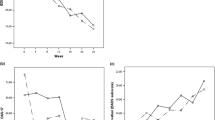Abstract
Eighteen mildly depressed subjects were randomly assigned to group or individual cognitive therapy. Twenty mildly depressed subjects were later recruited to serve as delayed treatment controls. Beck's cognitive therapy of depression was provided in a 6-week format by five graduate student therapists. Subjects were assessed before and after the 6-week treatment or waiting period using the Beck Depression Inventory, the D30 Depression Scale, the Brief Symptom Inventory, the State-Trait Anxiety Inventory, and the Tennessee Self Concept Scale. A repeated-measures multivariate analysis of variance determined that there was a significant treatment by time interaction. Subjects who received individual therapy improved more than subjects in the group and delayed treatment conditions. There were no statistically significant differences between subjects in the group and delayed treatment conditions, though subjects who received group therapy tended to show greater improvement than the controls..
Similar content being viewed by others
References
Beck, A. T., Rush, A. J., Shaw, B. F., & Emery, G. (1979).Cognitive therapy of depression. New York: Guilford.
Blaney, P. H. (1981). The effectiveness of cognitive and behavioral therapies. In L. P. Rehm (Ed.),Behavior therapy for depression. New York: Academic Press.
Dempsey, P. A. (1964). A unidimensional depression scale for the MMPI.Journal of Consulting Psychology, 28 364–370.
Derogatis, L. R., & Spencer, R. M. (1982).The brief symptom inventory: Administration, scoring and procedures manual. Baltimore: Clinical Psychometric Research.
Emery, G. (1982).Controlling depression through cognitive therapy. New York: BMA Audio Cassette Publications.
Fitts, W. H. (1965).Manual: Tennessee Self Concept Scale. Nashville: Counselor Recordings and Tests.
Rush, A. J., & Watkins, J. T. (1981). Group versus individual cognitive therapy: A pilot study.Cognitive Therapy and Research, 5 95–103.
Shapiro, J., Sank, L. I., Shaffer, C. S., & Donovan, D. C. (1982). Cost effectiveness of individual vs. group cognitive behavior therapy for problems of depression and anxiety in an HMO population.Journal of Clinical Psychology, 38 674–677.
Spielberger, C. D., Gorsuch, R. L., & Lushene, R. E. (1970).STAI manual for the State-Trait Anxiety Inventory. Palo Alto, California: Consulting Psychologists Press.
Author information
Authors and Affiliations
Additional information
An extended version of this manuscript is also available upon request from the first author.
Rights and permissions
About this article
Cite this article
Wierzbicki, M., Bartlett, T.S. The efficacy of group and individual cognitive therapy for mild depression. Cogn Ther Res 11, 337–342 (1987). https://doi.org/10.1007/BF01186284
Issue Date:
DOI: https://doi.org/10.1007/BF01186284




